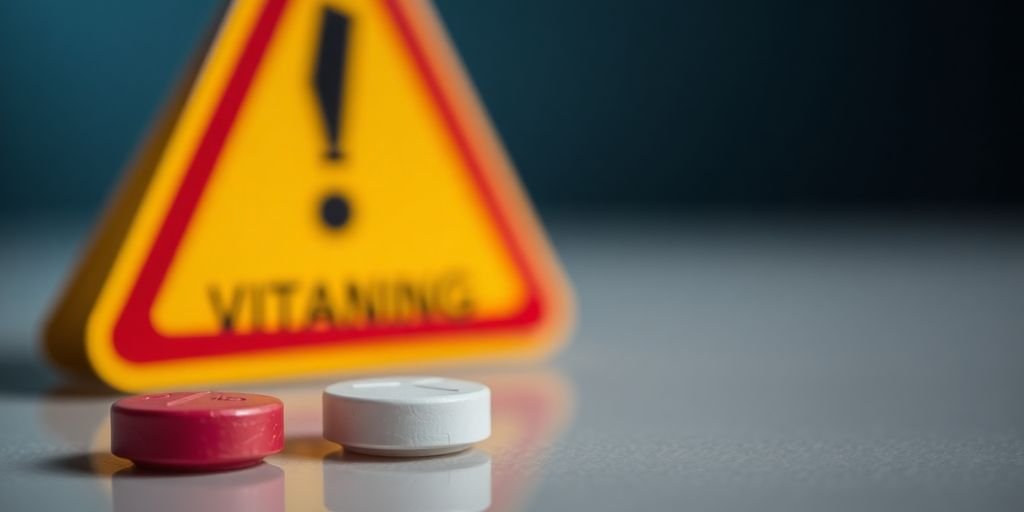Why Vitamin B12 is So Dangerous?

What is Vitamin B12?
Vitamin B12, also known as cobalamin, is a water-soluble vitamin that plays a vital role in keeping our bodies functioning properly. It’s one of those nutrients that doesn’t get talked about enough, but without it, we’d be in serious trouble. This vitamin is essential for producing red blood cells, supporting nerve health, and even helping with DNA synthesis.
What makes Vitamin B12 unique is that our bodies can’t produce it on their own. That means we have to get it from outside sources, like food or supplements. It’s primarily found in animal-based foods, which is why vegetarians and vegans often need to pay extra attention to their intake. The body also stores B12 in the liver, which is handy because it means we don’t need to consume it daily—but we do need to make sure we’re getting enough over time.
Here’s a quick look at some of its key roles:
- Helps in forming healthy red blood cells to prevent anaemia.
- Supports the nervous system and maintains brain health.
- Assists in converting food into energy (though it’s not an energy booster by itself).
Without sufficient Vitamin B12, we risk fatigue, memory issues, and even nerve damage. It’s one of those nutrients where balance is everything—neither too little nor too much is good for us.
While it might sound like a simple vitamin, its impact on overall health is anything but small. It’s a silent but powerful player in keeping us feeling our best.
The Importance of Vitamin B12 in the Body
Vitamin B12, often referred to as cobalamin, is a nutrient that plays a pivotal role in keeping our bodies functioning properly. It’s essential for the production of red blood cells, DNA synthesis, and the maintenance of nerve health. Without it, many basic bodily processes would come to a grinding halt.
One of the standout functions of Vitamin B12 is its ability to help convert the food we eat into energy. This nutrient works alongside other B vitamins to ensure that carbohydrates, fats, and proteins are metabolised effectively. In simpler terms, it’s like the spark plug for our internal engine, keeping us energised and active.
Additionally, Vitamin B12 is crucial for the formation of haemoglobin, the protein in red blood cells that carries oxygen throughout the body. Low levels of this vitamin can lead to anaemia, leaving us feeling fatigued and weak.
Let’s not forget its role in maintaining our nervous system. Vitamin B12 supports the production of myelin, the protective layer around our nerves. This ensures that nerve signals are transmitted efficiently, which is vital for everything from muscle movement to sensory perception.
In short, Vitamin B12 is not just another nutrient; it’s a cornerstone of our overall health and well-being. Skimping on it is simply not an option.
Common Sources of Vitamin B12
When it comes to Vitamin B12, nature has packed this essential nutrient into some pretty delicious foods. For many of us, these sources are enough to meet our daily needs without turning to supplements. But let’s break it down—what are the best places to get your B12?
- Animal-Based Foods:
- Fortified Foods:
- Supplements and Injections:
It’s worth noting that while plant-based diets are incredibly healthy, they can be low in natural sources of Vitamin B12. This is why fortified foods and supplements are often a must for vegans.
Keeping a balance is key. Whether you’re a meat-lover, vegetarian, or vegan, there’s a way to make sure you’re getting enough of this vital nutrient.
Deficiency Risks and Symptoms

Who is at Risk of Deficiency?
Certain groups of people are more likely to experience a Vitamin B12 deficiency. These include:
- Vegans and Vegetarians: Since Vitamin B12 is primarily found in animal products, those avoiding these foods may struggle to get enough.
- Older Adults: As we age, our bodies may absorb nutrients less efficiently, including Vitamin B12.
- Pregnant Individuals: Increased nutritional demands during pregnancy can sometimes lead to deficiencies.
- People with gastrointestinal conditions like Crohn’s disease or celiac disease, which can interfere with nutrient absorption.
- Individuals on certain medications, such as metformin or proton pump inhibitors, which might impact Vitamin B12 absorption.
Symptoms of Vitamin B12 Deficiency
Recognising the signs of a deficiency can help us address it early. Some common symptoms include:
- Fatigue and weakness
- Pale or jaundiced skin
- Shortness of breath and dizziness
- Tingling sensations or numbness in the hands and feet
- Cognitive issues like confusion or memory loss
Other, less common symptoms might include:
- Mood changes such as depression or irritability
- Glossitis, a painful inflammation of the tongue
- Visual disturbances
Untreated Vitamin B12 deficiency can lead to serious complications, including damage to the nervous system. If you suspect a deficiency, it’s essential to seek medical advice promptly.
By understanding who is at risk and recognising the symptoms, we can take steps to maintain healthy Vitamin B12 levels and prevent potential health issues.
Can Vitamin B12 Be Dangerous?

Risks of Overconsumption
While Vitamin B12 is generally considered safe due to its water-soluble nature, consuming excessive amounts—especially through supplements—can sometimes lead to issues. When the body has more B12 than it needs, it typically excretes the excess in urine. However, high doses, particularly in injectable form, have been linked to certain side effects. These may include acne outbreaks, skin redness, and even rosacea.
In rare cases, individuals with underlying conditions like kidney disease or diabetes may experience more severe consequences. For instance, some studies suggest that high doses of B12 could accelerate kidney function decline in those with diabetic nephropathy. Pregnant women taking extremely high doses should also be cautious, as there’s limited evidence suggesting a potential link to developmental risks in unborn children.
Potential Side Effects of Supplements
Even though adverse reactions to B12 are uncommon, they can occur, particularly with injections. Side effects might include:
- Mild diarrhoea or nausea
- Headaches and dizziness
- Itchy or irritated skin
- Rare but serious allergic reactions, such as swelling of the tongue or throat
In extremely rare cases, conditions like pulmonary oedema or blood clots have been reported. These are not typical but serve as a reminder that moderation is key.
Balancing your intake is crucial. Too much of anything—even something as beneficial as B12—can sometimes lead to unexpected issues. Let’s aim for just the right amount to support our health without tipping the scales.
Conclusion: Striking the Right Balance
When it comes to Vitamin B12, balance is absolutely key. It’s not just about avoiding a deficiency, which can have serious consequences, but also about steering clear of overdoing it. Too much of a good thing can sometimes lead to unexpected issues.
While Vitamin B12 is essential for energy production, red blood cell formation, and neurological health, it’s important to remember that more doesn’t always mean better. Over-supplementation can sometimes cause side effects like nausea, dizziness, or even interactions with other medications. That’s why we always recommend consulting with a healthcare professional before making big changes to your diet or supplement routine.
Here are a few tips to help strike the right balance:
- Know your needs: Your age, diet, and health conditions all play a role in how much Vitamin B12 you require.
- Choose your sources wisely: Whether it’s from foods like fish, eggs, and dairy, or from supplements, ensure you’re getting it in a way that suits your lifestyle.
- Monitor your intake: If you’re taking supplements, follow the recommended dosage and watch out for any unusual symptoms.
Achieving a healthy balance with Vitamin B12 is less about extremes and more about understanding your body’s unique needs. It’s a small but vital step in maintaining overall well-being.
Let’s keep it simple: listen to your body, eat a varied diet, and seek advice when in doubt. That’s how we make sure Vitamin B12 works for us, not against us.
Wrapping It Up
So, there you have it. Vitamin B12 is one of those nutrients that’s absolutely essential, but it’s not without its quirks. While it’s generally safe—even in high doses—it’s not a free pass to go overboard. For most people, a balanced diet does the trick, and supplements are only really necessary if you’ve got a deficiency or specific health needs. The takeaway? Don’t stress too much, but don’t ignore it either. If you’re unsure, have a quick chat with your doctor—they’ll steer you in the right direction. After all, it’s all about balance, isn’t it?
Frequently Asked Questions
What is vitamin B12, and why is it important?
Vitamin B12 is a vital nutrient that helps in making red blood cells, supporting nerve function, and producing DNA. It’s essential for keeping your body healthy and energetic.
What foods are rich in vitamin B12?
Foods like meat, fish, eggs, dairy products, and fortified cereals are great sources of vitamin B12. Vegans can opt for fortified plant-based milk or nutritional yeast.
Who is most at risk of vitamin B12 deficiency?
People who follow a vegan diet, older adults, pregnant women, and those with certain health conditions like digestive disorders are at higher risk of deficiency.
Can taking too much vitamin B12 be harmful?
While vitamin B12 is generally safe even in high amounts, excessive supplementation may cause side effects like headaches or dizziness in some people. Always follow medical advice.
What are the symptoms of vitamin B12 deficiency?
Symptoms include fatigue, weakness, numbness in hands or feet, memory problems, and mood changes. Severe deficiency can lead to nerve damage or anaemia.
Should I take vitamin B12 supplements if I feel tired?
If you’re feeling tired, it’s best to consult a doctor. While B12 can boost energy in those who are deficient, it might not help if your levels are already normal.
